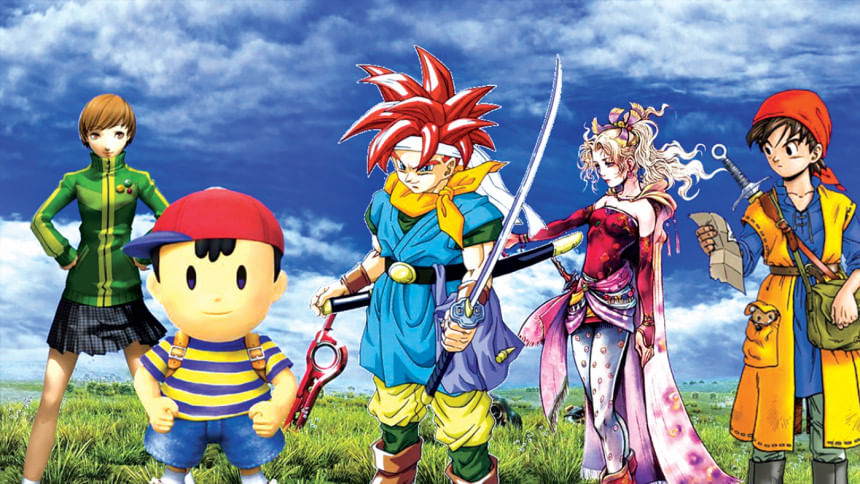IN DEFENCE OF QUIRKY JAPANESE GAMES

With recent controversy with GameFreak's announcement of no National Dex for the newest Pokémon games, and some claiming Nintendo's E3 presentation was lacklustre (only further proof of the Switch's weak points as a console), Japanese game developers are being scrutinised like never before.
Japan has a thriving game industry: the third largest behind the US and China. Nintendo's flagship titles (see: Smash, Pokémon, Mario etc.) and the Switch alone command a lot of the gaming market's money and attention. That's without taking into account Sony and the popularity of their Japanese franchises like Final Fantasy. Yet despite all this, Japanese games are often criticised or regarded as niche.
JRPGs and visual novels aren't as well regarded in the West as they are back home and derided often for being 'too anime'. Nintendo gets a lot of flak for its family-friendly gaming and tends to get overlooked by more 'serious' gamers. The Switch itself is subject to criticism for not being a powerful console compared to its competitors. It is also judged on its lack of 'quality titles'. Interestingly, when titles considered 'quality' like Witcher 3 appear, people joke that there's no point playing it because the experience won't be as good as playing it on a PC.
Now it's definitely fair to criticise Japanese developers to a good degree. They definitely don't cater as much to the international market: a lot of decisions are based on what Japan wants. A lot of the current Pokémon controversy is still localised to international complaints, but might be taken seriously if it gains more traction in Japanese social media, for example. Often you'll see many games not ported or localised outside of Japan. The PlayStation remains a popular hub for many Japanese games to arrive on, which means localisation is only half the battle for access. Japan's mobile gaming, another lucrative area given that heavyweights like Fate/Grand Order and Granblue Fantasy originate there, are also heavy on the gacha system. Gachas work by giving you rarity locked characters in exchange for in-game currency that's easier to get if you pay for it, and combined with abysmal draw rates, it's similar to loot boxes.
Persona 5 and Breath of the Wild were two of the biggest hits on release, cementing themselves almost immediately as killer apps for their respective platforms (PS3/4 and Switch). Keep in mind, their mobile games are wildly popular internationally as well. Fate/Grand Order, Pokémon Go and other games are often topping revenue lists.
You also don't see a lot of terrible Western gaming practices in Japanese games either. Barebones games that need DLC simply isn't a thing. DLC may be implemented, but often for free or cheap, and even the priciest ones usually still add something without making you feel like you needed it in the game from the start. Atlus' Persona 5: The Royal could've easily been an update to the original, but they've made it substantial enough it warranted its own game. Visual novels and JRPGs might be seen as niche and anime-esque, but they've gathered their own cult followings. Fate (originally a visual novel) never actually got a Western release, but fan translations sparked enough popularity in the genre that other titles are now frequently localised. Not every JRPG can be Final Fantasy, but the Tales series for example only grew in popularity as updated re-releases got both localisation and accessibility with ports. Indie developers also often take cues from Japanese gaming. Undertale is heavily inspired by MOTHER and Stardew Valley is a spiritual successor to Harvest Moon.
The uniqueness of Japanese games is understated. They're fun, quirky, and never aiming to do the same thing as Western games do. They set out to be their own product and they're not ashamed of that. You'll never see something like Okami come out of the West, with its cultural engagement and its breathtaking art. Dark Souls set a standard for challenging games and its own genre of challenge. The Trails series rivals even BioWare games for RPG lore and depth.
It's safe to say that Japanese games are fairly overlooked and unfairly criticised. Developers are churning out some amazing games, and as the gaming market is more aware of this now, this has translated to more accessibility, which in turn will only serve further to improve the quality of what these games bring to the industry as a whole and to gamers as well. It's time to give Japanese developers the benefit of the doubt.
Nuhan's back after realizing the philosophical significance of that painting with the dogs playing cards, and decided to channel out his existential dread caused by it by writing. Send him mildly morally questionable food choices at [email protected]

 For all latest news, follow The Daily Star's Google News channel.
For all latest news, follow The Daily Star's Google News channel. 



Comments